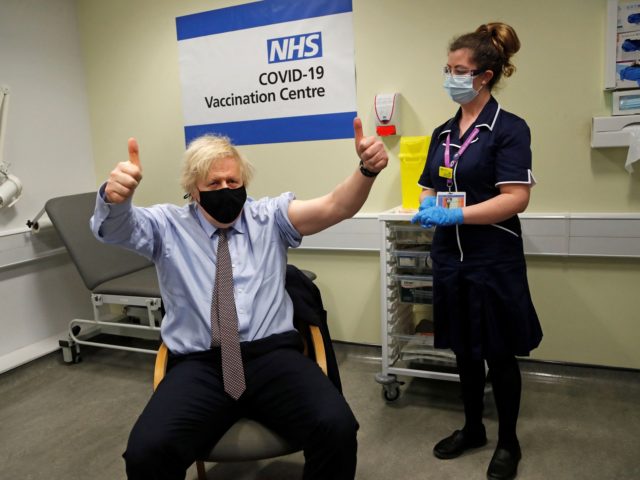Leading Brexiteer David Davis said that coronavirus vaccine passports should not be used domestically as Britain’s socialised healthcare system, the NHS, is too “incompetent” in handling private data.
Mr Davis, who resigned as former Prime Minister Theresa May’s Brexit secretary over her soft-Brexit deal, is the latest Conservative MP to come out against Boris Johnson’s vaccine passport push.
The Yorkshire MP said in an interview with Times Radio that the introduction of so-called COVID status certificates (vaccine passports) was an attempt by the government to “overcompensate” for their initial failures in containing the virus.
Davis went on to warn that such a system could present privacy risks, saying: “The health service has always been very, very incompetent, bluntly, at handling private data.
“Every time it tries to do something that is online or involves a long-range connection it loses data. It’s happened half a dozen times in the last ten years.”
He said that the government “made a few quite big mistakes last year”, particularly in allowing mass events to go forward during the outset of the pandemic, such as the Cheltenham Festival.
“They are, I think, overcompensating for those… because once you’ve got the level of herd immunity over 65-70 per cent, in terms of vaccination, and people have been ill, the super-spreader events don’t have the same effect,” Davis said.
His comments come as Prime Minister Boris Johnson –who is expected to announce a vaccine passport system for large scale events on Monday — is facing a growing rebellion in the House of Commons against the notion of domestic health papers.
Currently, over 70 MPs, including 41 in Johnson’s own party, have expressed their opposition to vaccine passports being deployed domestically. Should the number of Conservative MPs against the idea rise to around 60 and all opposition parties reject the measures, the government could lose the vote in the Commons, The Telegraph reported.
There are also growing concerns about the privacy implications of a vaccine passport app, with data being stored in a centralised database.
At present, the National Health Service (NHS) track and trace app only stores information about a user on their smartphone when they scan a QR code to enter a building. When the NHS finds that someone who scanned into a business has tested positive for the Chinese virus, then all people who entered the same building are sent a notification.
The vaccine passport apps being developed by the government, however, would see personal information being sent to a centralised vaccine database handled by the NHS, thereby giving the health service information about the whereabouts of individuals.
In an interview with Breitbart London in March, the CEO of the privacy firm DeleteMe, Rob Shavell, said: “Time and time again governments say that they are providing a data service to their citizens and claim that it will be protected, but what we see is this information ending up in data profiles available on Google searches.”
“The systems we have are too complicated and once that data gets digitised and out there and replicated in the country’s database that you are travelling to, with its own set of privacy protocols, you are looking at an expanding universe” of data that cannot be kept secure, the DeleteMe CEO added.
These concerns were backed up by Professor Alan Woodward, of the Surrey Centre for Cyber Security, who said: “The big question is going to be, will this app mean that when you check-in somewhere, this gets registered back to some central point? That would probably be an invasion of privacy because then you could track people.”
Professor of security engineering at Cambridge University, Ross Anderson, added: “I have serious concerns about this because if you start getting universal police surveillance hooked into NHS systems, then that has all sorts of horrible implications down the line.”
Follow Kurt Zindulka on Twitter here @KurtZindulka

COMMENTS
Please let us know if you're having issues with commenting.